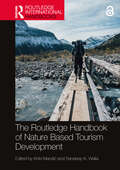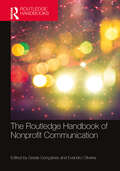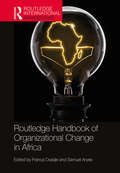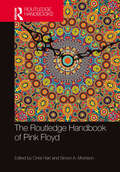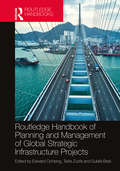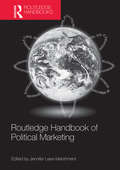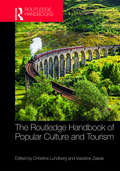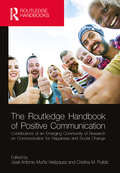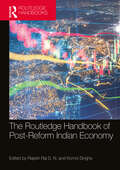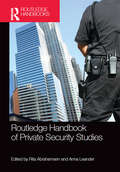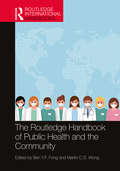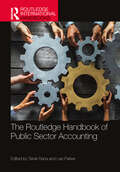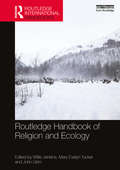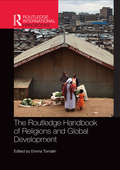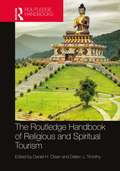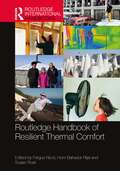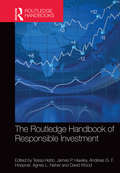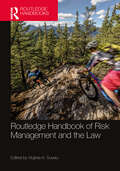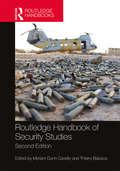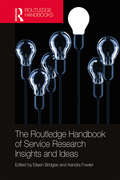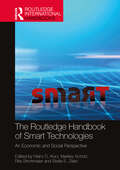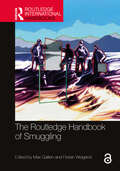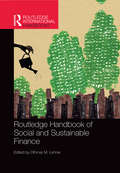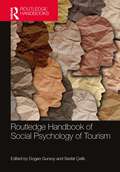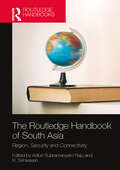- Table View
- List View
The Routledge Handbook of Nature Based Tourism Development (Routledge International Handbooks)
by Ante Mandić Sandeep K. WaliaThis handbook offers a comprehensive overview of the themes and concepts related to nature-based tourism development. Providing interdisciplinary insights from leading researchers, academics, and practitioners across the globe, it delivers a critical and timely contribution to the knowledge around nature-based tourism. Nature-based tourism is currently the fastest-growing tourism sector globally and for many destinations, the most significant tourism segment. Organized into five parts, this handbook provides contemporary and cutting-edge perspectives on core topics and explores their linkages. It considers, among others, various natural settings and natural attractions where nature-based tourism can be exercised, including: protected and conserved areas, islands, and mountains; the emerging themes shaping the contemporary nature-based tourism development, including ethics, Sustainable Development Goals, COVID-19 crisis, over-tourism, climate change, resilience; and new approaches toward the visitor management and low-impact experience design, including regenerative and transformative tourism, destination stewardship and pro-environmental behaviour. Part I introduces the concept of nature-based tourism and the emerging challenges in the field. Part II explores the key components in the management and planning of nature-based tourism development. In Part III the handbook focuses on visitor experience design and management and Part IV highlights the impacts of nature-based tourism. Part V examines the future of nature-based tourism and possible solutions to mitigate associated challenges in the field. The handbook offers a valuable contribution with a systematic outlook of the phenomenon of nature-based tourism and critical perspectives on key concepts, policy, and practice. It shares current knowledge, innovative tools, and sustainable solutions with substantial evidence and societal impact. The book will appeal to students, researchers, and professionals in the fields of tourism, human geography, leisure studies, business studies, and sociology.
The Routledge Handbook of Nonprofit Communication (Routledge Handbooks in Communication Studies)
by Gisela Gonçalves Evandro OliveiraThis handbook brings together multidisciplinary and internationally diverse contributors to provide an overview of theory, research, and practice in the nonprofit and nongovernmental organization (NGO) communication field. It is structured in four main parts: the first introduces metatheoretical and multidisciplinary approaches to the nonprofit sector; the second offers distinctive structural approaches to communication and their models of reputation, marketing, and communication management; the third focuses on nonprofit organizations’ strategic communications, strategies, and discourses; and the fourth assembles campaigns and case studies of different areas of practice, causes, and geographies. The handbook is essential reading for scholars, educators, and advanced students in nonprofit and NGO communication within public relations and strategic communication, organizational communication, sociology, management, economics, marketing, and political science, as well as a useful reference for leaders and communication professionals in the nonprofit sector.
Routledge Handbook of Organizational Change in Africa (Routledge International Handbooks)
by Franca Ovadje Samuel AryeeAlthough change management and therefore effective adaptation to environmental complexity is considered a uniquely human cultural activity, the extensive change management literature is largely based on the experiences of organizations in the advanced economies of the West. As the economies of African countries become increasingly open, African organizations will need to be agile in order to adapt and grow in a dynamic, global environment. Currently, there is a dearth of contextualized knowledge on change management within Africa, but this handbook aims to address this by bringing together a wide range of experts to explore organizational change and change management from an African context. The handbook adopts a multidisciplinary (historical, philosophical, processual, and strategic) perspective as well as empirical accounts of change management. It addresses such issues as: What are the external and internal pressures for change? What is the content and process of change management? What are the essentials of effective change management? How can change management be theorized from an African perspective? What sort of leadership can best align with change management demands in an African context? How do organizations build internal change management capability? It is hoped that answers to these questions contained in the handbook will provide a contextualized understanding of change management which African organizations and scholars can leverage to respond to the threats and opportunities inherent in their increasingly dynamic environment. The handbook should constitute an essential reference for academics, researchers, and advanced students of change management, development studies, and African studies, as well as practitioners.
The Routledge Handbook of Pink Floyd (Routledge Music Handbooks)
by Chris Hart Simon A. MorrisonThe Routledge Handbook of Pink Floyd is intended for scholars and researchers of popular music, as well as music industry professionals and fans of the band. It brings together international researchers to assess, evaluate and reformulate approaches to the critical study and interpretation of one of the world’s most important and successful bands. For the first time, this Handbook will ‘tear down the wall,’ examining the band’s collective artistic creations and the influence of social, technological, commercial and political environments over several decades on their work. Divided into five parts, the book provides a thoroughly contextualised overview of the musical works of Pink Floyd, including coverage of performance and sound; media, reception and fandom; genre; periods of Pink Floyd’s work; and aesthetics and subjectivity. Drawing on art, design, performance, culture and counterculture, emergent theoretical resources and analytical frames are evaluated and discussed from across the social sciences, humanities and creative arts. The Handbook is intended for scholars and researchers of popular music, as well as music industry professionals. It will appeal across a range of related subjects from music production to cultural studies and media/communication studies.
Routledge Handbook of Planning and Management of Global Strategic Infrastructure Projects
by Edward Ochieng Tarila Zuofa Sulafa BadiThis book examines complex challenges in managing major strategic economic and social infrastructure projects. It is divided into four primary themes: value-based approach to infrastructure systems appraisal, enabling planning and execution, financing and contracting strategies for infrastructure systems and digitising major infrastructure delivery. Within these four themes, the chapters of the book cover: the value and benefits of infrastructure projects planning for resilient major infrastructure projects sustainable major infrastructure development and management, including during mega events improving infrastructure project financing stakeholder engagement and multi-partner collaborations delivering major infrastructure projects effectively and efficiently whole-life-cycle performance, operations and maintenance relationship risks on major infrastructure projects public-private partnerships, design thinking principles, and innovation and technology. By drawing on insights from their research, the editors and contributors bring a fresh perspective to the transformation of major strategic infrastructure projects. This text is designed to help policymakers and investors select and prioritise their infrastructure needs beyond the constraining logic of political cycles. It offers a practical set of recommendations for governments on attracting private capital for infrastructure projects while creating clear social and economic value for their citizens. Through theoretical underpinning, empirical data and in-depth informative global case studies, the book presents an essential resource for students, researchers, practitioners and policymakers interested in all aspects of strategic infrastructure planning, project management, construction management, engineering and business management.
Routledge Handbook of Political Marketing
by Jennifer Lees-MarshmentWith the Obama campaign universally acknowledged as the most successfully marketed presidential campaign of all time, the future of political marketing is fiercely contested, provoking a wealth of high quality scholarship from across the globe. This work provides an accessible introduction to the field, international in both content and authorship, which will set the direction of future research. Routledge Handbook of Political Marketing contains cutting edge contributions written by academic experts and informed practitioners but will also have a cohesive structure, containing emerging areas and authors alongside established ones. The handbook addresses the practicalities as well as the broader impact of political marketing on politics including its’ role in the changing relationship between political leaders, parties and voters. With each chapter providing a comparative and carefully structured discussion of a key topic, the handbook examines issues within the following broad themes: Understanding the market, gathering ideas, and debate Product development, branding and strategy Internal Marketing Communicating and connecting with the public Government Marketing - delivery, policy and leadership With each chapter written to a common template presenting new research and contemporary case studies, the handbook combines a succinct presentation of the latest research with an accessible and systematic format that will be of great interest to scholars and practitioners alike.
The Routledge Handbook of Popular Culture and Tourism
by Christine Lundberg Vassilios ZiakasThis handbook provides a comprehensive overview and holistic analysis of the intersection between tourism and popular culture. It examines current debates, questions and controversies of tourism in the wake of popular culture phenomena and explores the relationships between popular culture, globalization, tourism and mobility. In addition, it offers a cross-disciplinary, cutting edge review of the character of popular cultural production and consumption trends, analyzing their consequences for tourism, spatial strategies and destination competitiveness. The scope of the volume encompasses various expressions of popular culture such as cinema, TV shows, music, literature, sports and heritage. Featuring a mix of theoretical and empirical chapters, the handbook problematizes and conceptualizes the ties and clusters of popular cultural actors, thereby positioning tourism within the wider context of creative economies, cultural planning and multimodal technologies. Written by an international team of academics with expertise in a range of disciplines, this timely book will be of interest to researchers from a variety of subjects including tourism, events, geography, cultural studies, fandom research, political economy, business, media studies and technology.
The Routledge Handbook of Positive Communication: Contributions of an Emerging Community of Research on Communication for Happiness and Social Change (Routledge Handbooks in Communication Studies)
by José Antonio Muñiz Velázquez Cristina M. PulidoThe Routledge Handbook of Positive Communication forms a comprehensive reference point for cross-disciplinary approaches to understanding the central role of communication in the construction of hedonic and eudemonic happiness,or subjective and psychological well-being. Including contributions from internationally recognized authors in their respective fields, this reference uses as its focus five main scenarios where communication affects the life of individuals: mass and digital media, advertising and marketing communication, external and internal communication in companies and organizations, communication in education, and communication in daily life interactions.
The Routledge Handbook of Post-Reform Indian Economy
by Rajesh Raj S. N. and Komol SinghaThis handbook presents a comprehensive study of the post-reform Indian economy, three decades after the economic liberalization started in the early 1990s. It studies the broad range of changes that were introduced in the reforms era, assessing their impact on sectors like manufacturing, agriculture, banking and finance, among others. It also assesses the performance of these sectors amid globalization and the socio-economic shifts in the country. The volume evaluates the contribution of the reforms to social transformation, social inclusion, sustainability and human development, and deliberates on the gains, blind spots and limitations. With contributions from scholars across the country, case studies and comparative analyses that draw on data analysis, econometric evidence and historical sensibility, this is an authoritative volume on the reforms of the 1990s and their impact on the Indian economy and people. Topical and the first of its kind, the book will be a useful resource for scholars and researchers of economics, development studies, political economy, management studies, public policy and political studies.
Routledge Handbook of Private Security Studies
by Rita Abrahamsen & Anna LeanderThis new Handbook offers a comprehensive overview of current research on private security and military companies, comprising essays by leading scholars from around the world. The increasing privatization of security across the globe has been the subject of much debate and controversy, inciting fears of private warfare and even the collapse of the state. This volume provides the first comprehensive overview of the range of issues raised by contemporary security privatization, offering both a survey of the numerous roles performed by private actors and an analysis of their implications and effects. Ranging from the mundane to the spectacular, from secretive intelligence gathering and neighbourhood surveillance to piracy control and warfare, this Handbook shows how private actors are involved in both domestic and international security provision and governance. It places this involvement in historical perspective, and demonstrates how the impact of security privatization goes well beyond the security field to influence diverse social, economic and political relationships and institutions. Finally, this volume analyses the evolving regulation of the global private security sector. Seeking to overcome the disciplinary boundaries that have plagued the study of private security, the Handbook promotes an interdisciplinary approach and contains contributions from a range of disciplines, including international relations, politics, criminology, law, sociology, geography and anthropology. This book will be of much interest to students of private security companies, global governance, military studies, security studies and IR in general.
The Routledge Handbook of Public Health and the Community (Routledge International Handbooks)
by Ben Y.F. FongCommunity health is an emerging and growing discipline of public health and it focuses on the physical, social, and mental well-being of the people of specific districts. This interdisciplinary field brings together aspects of health care, economics, environment, and people interaction. This handbook is a comprehensive reference on public health for higher education students, scholars, practitioners, and policymakers of health care. There are five key thematic sections in the book: perspectives in public health; community health in practise; planning, built, and social environment and community health; digital and mobile health; and, towards sustainable health in the community. Each theme explores the leading research and trends. This book aims to help achieve the shared goal of healthier communities and quality of life for the residents. This collaborative work should be a very useful handbook to health professionals and government bodies in the planning of initiatives to improve population health, prevent chronic diseases, control infectious diseases and outbreaks, and prepare for natural disasters. This handbook integrates research and practise of public health in the community.
The Routledge Handbook of Public Sector Accounting (Routledge International Handbooks)
by Tarek Rana Lee ParkerThe Routledge Handbook of Public Sector Accounting explores new developments and transformations in auditing, management control, performance measurement, risk management and sustainability work in the contemporary world of the public sector and the functioning of accounting and management in that realm. It focuses on critical analysis and reflection with respect to changing risk and crisis management patterns in the public sector in the current Covid- 19 and post- Covid- 19 era, across diverse social, political and institutional settings globally. This research-based edited book, targeted at scholars, professionals, teachers and consultants inthe fields of public sector accounting, auditing, accountability and management, offers high-level insights into the new architecture and execution of such activities in the emerging post-pandemic world. The chapters are written by leading scholars in the accounting and public administration disciplines internationally and provide important assessments, frameworks and recommendations concerning a wide variety of institutions, practices and policies with a view to addressing the many emerging societal, governmental and professional issues. Spanning theoretical, empirical and policy discussion contributions, the book’s chapters will be readily accessible to accounting, auditing and management audiences alike.
Routledge Handbook of Religion and Ecology (Routledge Environment and Sustainability Handbooks)
by Willis Jenkins, Mary Evelyn Tucker and John GrimThe moral values and interpretive systems of religions are crucially involved in how people imagine the challenges of sustainability and how societies mobilize to enhance ecosystem resilience and human well-being. The Routledge Handbook of Religion and Ecology provides the most comprehensive and authoritative overview of the field. It encourages both appreciative and critical angles regarding religious traditions, communities, attitude, and practices. It presents contrasting ways of thinking about "religion" and about "ecology" and about ways of connecting the two terms. Written by a team of leading international experts, the Handbook discusses dynamics of change within religious traditions as well as their roles in responding to global challenges such as climate change, water, conservation, food and population. It explores the interpretations of indigenous traditions regarding modern environmental problems drawing on such concepts as lifeway and indigenous knowledge. This volume uniquely intersects the field of religion and ecology with new directions within the humanities and the sciences. This interdisciplinary volume is an essential reference for scholars and students across the social sciences and humanities and for all those looking to understand the significance of religion in environmental studies and policy.
The Routledge Handbook of Religions and Global Development (Routledge International Handbooks)
by Emma TomalinThis Handbook provides a cutting-edge survey of the state of research on religions and global development. Part one highlights critical debates that have emerged within research on religions and development, particularly with respect to theoretical, conceptual and methodological considerations, from the perspective of development studies and its associated disciplines. Parts two to six look at different regional and national development contexts and the place of religion within these. These parts integrate and examine the critical debates raised in part one within empirical case studies from a range of religions and regions. Different religions are situated within actual locations and case studies thus allowing a detailed and contextual understanding of their relationships to development to emerge. Part seven examines the links between some important areas within development policy and practice where religion is now being considered, including: Faith-Based Organisations and Development Public Health, Religion and Development Human rights, Religion and Development Sustainable Development, Climate Change and Religion Global Institutions and Religious Engagement in Development Economic Development and Religion Religion, Development and Fragile States Development and Faith-Based Education Taking a global approach, the Handbook covers Africa, Latin America, South Asia, East and South-East Asia, and the Middle East. It is essential reading for students and researchers in development studies and religious studies, and is highly relevant to those working in area studies, as well as a range of disciplines, from theology, anthropology and economics to geography, international relations, politics and sociology.
The Routledge Handbook of Religious and Spiritual Tourism
by Daniel H. Olsen Dallen J. TimothyThe Routledge Handbook of Religious and Spiritual Tourism provides a robust and comprehensive state-of-the-art review of the literature in this growing sub-field of tourism. This handbook is split into five distinct sections. The first section covers past and present debates regarding definitions, theories, and concepts related to religious and spiritual tourism. Subsequent sections focus on the supply and demand aspects of religious and spiritual tourism markets, and examine issues related to the management side of these markets around the world. Areas under examination include religious theme parks, the UNESCO branding of religious heritage, gender and performance, popular culture, pilgrimage, environmental impacts, and fear and terrorism, among many others. The final section explores emerging and future directions in religious and spiritual tourism, and proposes an agenda for further research. Interdisciplinary in coverage and international in scope through its authorship and content, this will be essential reading for all students, researchers, and academics interested in Tourism, Religion, Cultural Studies, and Heritage Studies.
Routledge Handbook of Resilient Thermal Comfort (Routledge International Handbooks)
by Fergus NicolThis book brings together some of the finest academics in the field to address important questions around the way in which people experience their physical environments, including temperature, light, air-quality, acoustics and so forth. It is of importance not only to the comfort people feel indoors, but also the success of any building as an environment for its stated purpose. The way in which comfort is produced and perceived has a profound effect on the energy use of a building and its resilience to the increasing dangers posed by extreme weather events, and power outages caused by climate change. Research on thermal comfort is particularly important not only for the health and well-being of occupants but because energy used for temperature control is responsible for a large part of the total energy budget of the built environment. In recent years there has been an increasing focus on the vulnerabilities of the thermal comfort system; how and why are buildings failing to provide safe and agreeable thermal environments at an affordable price? Achieving comfort in buildings is a complex subject that involves physics, behaviour, physiology, energy conservation, climate change, and of course architecture and urban design. Bringing together the related disciplines in one volume lays strong, multi-disciplinary foundations for new research and design directions for resilient 21st century architecture. This book heralds workable solutions and emerging directions for key fields in building the resilience of households, organisations and populations in a heating world.
The Routledge Handbook of Responsible Investment (Routledge Companions in Business, Management and Accounting)
by Tessa Hebb James P. Hawley Andreas G.F. Hoepner Agnes L. Neher David WoodThe UN-supported Principles for Responsible Investment initiative has led to around a third of the world’s financial assets being managed with a commitment to invest in a way that considers environmental, social or governance (ESG) criteria. The responsible investment trend has increased dramatically since the global financial crisis, yet understanding of this field remains at an early stage. This handbook provides an atlas of current practice in the field of responsible investment. With a large global team of expert contributors, the book explores the impact of responsible investment on key financial actors ranging from mainstream asset managers to religious organizations. Offering students and researchers a comprehensive introduction to current scholarship and international structures in the expanding discipline of responsible investment, this handbook is vital reading across the fields of finance, economics and accounting.
Routledge Handbook of Risk Management and the Law
by Virginia A. SuveiuIn today’s highly globalized and regulated economy, private and public organizations face myriad complex laws and regulations. A process designed to detect and prevent regulatory compliance failures is vital. However, such an effective process cannot succeed without development and maintenance of a strong compliance and legal risk management culture. This wide-ranging handbook pulls together work from experts across universities and industries around the world in a variety of key disciplines such as law, management, and business ethics. It provides an all-inclusive resource, specifying what needs to be known and what needs to be further pursued in these developing areas. With no such single text currently available, the book fills a gap in our current understanding of legal risk management, regulatory compliance, and ethics, offering the potential to advance research efforts and enhance our approaches to effective legal risk management practices. Edited by an expert on legal risk management, this book is an essential reference for students, researchers, and professionals with an interest in business law, risk management, strategic management, and business ethics.
Routledge Handbook of Security Studies
by Myriam Dunn Cavelty and Thierry BalzacqThis revised and updated second edition features over twenty new chapters and offers a wide-ranging collection of cutting-edge essays from leading scholars in the field of Security Studies. The field of Security Studies has undergone significant change during the past 20 years, and is now one of the most dynamic sub-disciplines within International Relations. This second edition has been significantly updated to address contemporary and emerging security threats with chapters on organised crime, migration and security, cyber-security, energy security, the Syrian conflict and resilience, amongst many others. Comprising articles by both established and up-and-coming scholars, The Routledge Handbook of Security Studies provides a comprehensive overview of the key contemporary topics of research and debate in the field of Security Studies. The volume is divided into four main parts: • Part I: Theoretical Approaches to Security • Part II: Security Challenges • Part III: Regional (In)Security • Part IV: Security Governance This new edition of the Handbook is a benchmark publication with major importance for both current research and the future of the field. It will be essential reading for all scholars and students of Security Studies, War and Conflict Studies, and International Relations.
The Routledge Handbook of Service Research Insights and Ideas
by Eileen BridgesThe Routledge Handbook of Service Research Insights and Ideas offers authoritative coverage of current scholarship in the expanding discipline of service research. Original chapters from the world’s leading specialists in the discipline explore foundations and innovations in services, highlighting important issues relating to service providers, customers, and service design. The volume goes beyond previous publications by drawing together material from different functional areas, including marketing, human resource management, and service process design and operations. These topics are important in helping readers become knowledgeable about how different functional areas interact to create a successful customer experience. This book is ideal as a first port of call for postgraduate students desiring to get up to speed quickly in the services discipline. It is also a must-read for academics new to services who want to access cutting-edge research.
The Routledge Handbook of Smart Technologies: An Economic and Social Perspective (Routledge International Handbooks)
by Heinz D. Kurz Marlies Schütz Rita Strohmaier Stella S. ZilianThis Handbook provides a thorough discussion of the most recent wave of technological (and organisational) innovations, frequently called “smart” and based on the digitisation of information. The acronym stands for "Self-Monitoring, Analysis and Reporting Technology". This new wave is one in a row of waves that have shaken up and transformed the economy, society and culture since the first Industrial Revolution and have left a huge impact on how we live, think, communicate and work: they have deeply affected the socioeconomic metabolism from within and humankind’s footprint on our planet. The Handbook analyses the origins of the current wave, its roots in earlier ones and its path-dependent nature; its current forms and actual manifestations; its multifarious impact on economy and society; and it puts forward some guesstimates regarding the probable directions of its further development. In short, the Handbook studies the past, the present and the future of smart technologies and digitalisation. This cutting-edge reference will appeal to a broad audience, including but not limited to, researchers from various disciplines with a focus on technological innovation and their impact on the socioeconomic system; students across different fields but especially from economics, social sciences and law studying questions related to radical technological change and its consequences, as well as professionals around the globe interested in the debate of smart technologies and socioeconomic transformation, from a multi- and interdisciplinary perspective.
The Routledge Handbook of Smuggling (Routledge International Handbooks)
by Max GallienThe Routledge Handbook of Smuggling offers a comprehensive survey of interdisciplinary research related to smuggling, reflecting on key themes, and charting current and future trends. Divided into six parts and spanning over 30 chapters, the volume covers themes such as mobility, borders, violent conflict, and state politics, as well as looks at the smuggling of specific goods – from rice and gasoline to wildlife, weapons, and cocaine. Chapters engage with some of the most contentious academic and policy debates of the twenty-first century, including the historical creation of borders, re-bordering, the criminalisation of migration, and the politics of selective toleration of smuggling. As it maps a field that contains unique methodological, ethical, and risk-related challenges, the book takes stock not only of the state of our shared knowledge, but also reflects on how this has been produced, pointing to blind spots and providing an informed vision of the future of the field. Bringing together established and emerging scholars from around the world, The Routledge Handbook of Smuggling is an indispensable resource for students and researchers of conflict studies, borderland studies, criminology, political science, global development, anthropology, sociology, and geography.
Routledge Handbook of Social and Sustainable Finance (Routledge International Handbooks)
by Othmar M. LehnerRoutledge Handbook of Social and Sustainable Finance brings together an international cast of leading authorities to map out and display the disparate voices, traditions and professional communities engaged in social finance activity. With a clear societal or environmental mission, foundations, individual and group investors, as well as public bodies around the world have become increasingly eager to finance and support innovative forms of doing business. Together, founders and established businesses alike are embracing new sustainable business models with a distinct stakeholder approach to tackle social or environmental problems in what they see as a failed economic system in crisis. As a result, the topic of social and sustainable finance is at the forefront of financial economic thought. This Handbook is divided up into three parts. The first, "The Landscape of Social and Sustainable Finance and Investments", comprises of chapters from a multitude of perspectives in an effort to grasp the entirety of the landscape. The second, "Challenges, Suggestions, Critiques and Debates", focuses on areas ranging from sociological underpinnings to critical takes on markets, and the identification of specialized business models. Amongst ethical considerations, topics include the scaling of impact, an analysis of sustainability as risk prevention and comparative analyses of various methods of justification and measurement. In the third and final section, "Markets and Institutions", contributions range from various perspectives on sustainable banking to environmental marketplaces, and finally on to practical cases and country specific observations. This volume is essential reading for both academics and students in economics and finance. It is also of interest to those who study environmental economics, microeconomics and banking.
Routledge Handbook of Social Psychology of Tourism (Contemporary Geographies of Leisure, Tourism and Mobility)
by Dogan GursoyThe impacts of tourism, an increasingly crucial area of study amongst researchers, are primarily investigated through economic, socio-cultural or environmental perspectives. The social psychological effects of tourism have not been adequately researched despite often being much more important for many destinations, especially where conflicts among different stakeholders exist. This book investigates the social psychological effects of tourism within the scope of social psychology theory. This book introduces the concept of social psychology, as distinct from psychology and sociology, and its relationship to tourism, examines tourism within various theoretical frameworks, e.g. career ladder theory and Maslow’s 7 hierarchy, explores the ways in which tourism changes attitudes and finally investigates social psychological issues in tourism business. It is an important resource for advanced undergraduates, graduate students and relevant practitioners in the field of tourism, and in some cases for a broader public in the field of social psychology.
The Routledge Handbook of South Asia: Region, Security and Connectivity
by Adluri Subramanyam Raju R. SrinivasanThis handbook presents an authoritative overview of South Asia through the lens of geopolitics, political dynamics, economics, human security, and sustainable development. It brings together key insights from various disciplines to provide an in-depth understanding of the genesis, course, and future potential of South Asia as a region. The handbook: • Explores the post-colonial political landscape of India, Pakistan, Sri Lanka, the Maldives, Nepal, Bhutan and Afghanistan and analyses the challenges to political stability and governance in South Asia. • Studies the opportunities and challenges produced by globalization and recommends solutions towards greater connectivity and trade in South Asia. • Delves into the issues of climate change, water and land resource dependency, and energy security and singles out policy challenges as well as positive actions to promote sustainable development and implement the blue economy. • Discusses the political dynamics of regional cooperation between countries and the role of China in South Asian regional affairs. An invaluable addition to the study of South Asia, this volume will be an indispensable resource for scholars, teachers and researchers of political science, international relations, South Asia studies, South Asian politics, history, defence and strategic studies, political economy, developmental studies, public policy and sustainability studies.
